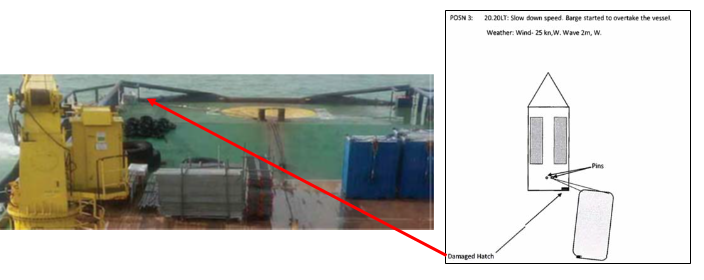Engine room emergency hatch damage
What happened?
An anchor handling tug supply (AHTS) vessel, whilst towing a barge, encountered heavy seas (wind on the beam, 25 knots, waves, 2m) and began to roll heavily. In order to avoid damage to the barge, the Master decided to slack off the towing wire by 10m. As soon as the vessel and barge came to calmer water, speed was picked up to 6-8 knots. Then, for other reasons the Master had to reduce the speed of the vessel again. The momentum of the barge was such that it continued to move in such a way that the towing line caught the open hatch of the emergency exit from the Engine Room, which had been kept open at sea.
What went wrong? Investigation and findings
- All watertight openings were not physically inspected before sailing to ensure they were secured for sea, despite requirements in company operations manual that this should be done;
- Crew had decided to keep the Engine Room hatch open due to insufficient Engine Room ventilation leading to a high air temperatures, in turn leading to alarms being triggered;
- The problem with the ventilation system in the Engine Room had been experienced for a long period of time, but had not been reported to the relevant parties nor any investigation conducted;
The original stern fenders of the vessel had been temporarily replaced by smaller fenders, which made it difficult to keep the towed barge tight to a stern of the vessel while towing.

What lessons were learnt? And what were the actions?
- Any defect or abnormal condition onboard should be reported immediately to relevant parties;
- the problem with engine room ventilation system would be investigated. A new hatch to be fabricated and installed as soon as possible;
- further training provided on board emphasizing importance of timely defect reporting;
- Original fenders would be reinstalled at stern for safer towing operations;
Further coaching and training provided on board to ensure proper physical inspection of all watertight openings before sailing.
Members may wish to refer to the following incident:
Safety Event
Published: 9 June 2017
Download: IMCA SF 14/17
IMCA Safety Flashes
Submit a Report
IMCA Safety Flashes summarise key safety matters and incidents, allowing lessons to be more easily learnt for the benefit of all. The effectiveness of the IMCA Safety Flash system depends on Members sharing information and so avoiding repeat incidents. Please consider adding safetyreports@imca-int.com to your internal distribution list for safety alerts or manually submitting information on incidents you consider may be relevant. All information is anonymised or sanitised, as appropriate.
IMCA’s store terms and conditions (https://www.imca-int.com/legal-notices/terms/) apply to all downloads from IMCA’s website, including this document.
IMCA makes every effort to ensure the accuracy and reliability of the data contained in the documents it publishes, but IMCA shall not be liable for any guidance and/or recommendation and/or statement herein contained. The information contained in this document does not fulfil or replace any individual’s or Member's legal, regulatory or other duties or obligations in respect of their operations. Individuals and Members remain solely responsible for the safe, lawful and proper conduct of their operations.
